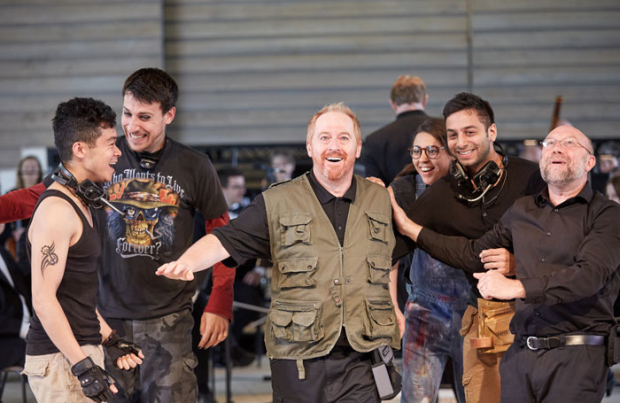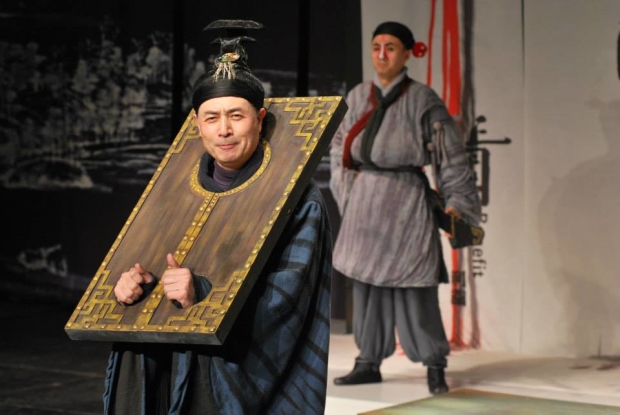Michael Coveney: Shakespeare celebrated in country house Dream and Mandarin Richard III
The Bard’s global appeal was showcased again this week

© Mark Douet
Those actors – Marty Cruickshank as Hippolyta/Titania, David Rintoul as Theseus/Oberon (those doublings first introduced by Brook), Forbes Masson as Bottom – were indeed from the RSC, directed by Owen Horsley ("under the creative guidance of Gregory Doran"; come on, Greg, give the boy a break!) – and were channelling that spirit in the play that suggests it was first performed in a country house setting, on the site of the Alveston Manor hotel in Stratford-upon-Avon.
This was a black-tie dinner-time divertissement on the Getty estate in Buckinghamshire that now hosts the Garsington Opera – Garsington Opera at Wormsley – with a crowd of well-heeled great and good dining in white pavilions on picnics and Jamie Oliver's "fabulous feasts" around the glorious cricket pitch. But the event, with the Garsington orchestra and chorus conducted by Douglas Boyd, was seriously enjoyable, too, even if the acoustics of Robin Snell's thrilling "temporary" structure of steel, wood and glass were kinder to the musicians than to the actors.
And there was nothing Victorian or "precious" in the playing – Rintoul removed Theseus's formal white shirt to become a hairy-chested Oberon, Cruikshank managed two strands of amelioration, social and sexual, and Masson played his Scottish Bottom with a wink and sideways slide – as the Mendelsohn, not all of it instantly familiar (I doubt if the full score has been played in a theatre setting since Max Reinhardt's open air extravaganza, with 200 fairies, on Headington Hill in 1933), was re-absorbed into the lovers' ding-dong, the two chorales for twinkling sprites, Bottom's dream and the gorgeous midnight dispersal.
The whole show – and the play is far less "abridged" than I was expecting – is on the South Bank this week, in the Queen Elizabeth Hall, before one final performance on the Stratford-upon-Avon main stage this Sunday. It will be fascinating to see how it looks (and hears) away from its idyllic comfort zone, though it's only fair to add that Garsington, like the big daddy of all country house opera, Glyndebourne, tours extensively, works with schools and provides live screenings. So it's not all champers, cummerbunds and up-market canapés.
'The place erupted. We had cultural meltdown'
At the other end of the exotic spectrum, the National Theatre of China has returned to Shakespeare's Globe where the company is sharing the stage this week with Charles Edwards's revelatory new Richard II, directed by Simon Godwin. Their show is the Richard III – big week for the two Dicks – that visited the Globe to Globe season in 2012 but lost all its costumes, masks and paraphernalia in transit, and it's the most enthralling fun, even if they seem to have confused the play in their own minds with Macbeth – which the Tang-Shu Wing company from Hong Kong are bringing next month (they did Titus Andronicus in 2012).

© Shakespeare's Globe
So, from the outset, Zhang Hao's magnetic Crookback – a lithe, athletic creature who only hobbles when he's on his own, or in cahoots with the audience – is pursued not only by Queen Margaret's curses but also by three witches breathing hubble, bubble, toil and trouble. While the sequences of the play are intact, the text is obviously a prose simulacrum (rather like Ivo van Hove's Dutch histories), with narrative summations on the surtitles.
So it's the spirit of Shakespeare, not his language, celebrated here. I never thought, for instance, that I'd be chanting "Long live the king" in Mandarin with an audience of Oriental scholars, Chinese businessmen (and the Chinese ambassador to London) and curious tourists at the coronation scene. And when Zhang Hao, tortured by ghosts and entombed in a circle of spears cries "A horse, a horse, my kingdom for a horse," in guttural English, the place erupted. We had cultural meltdown.
But we still had something distinctly Chinese: the action is accompanied on a battery of brilliantly played drums, the costumes (we can now see) are an array of ceremonial robes in blacks, browns and mauves, the masks and tumbling – tremendous, hilarious work from a pair of clowns as all the murderers and a two-headed Tyrrell – pure Peking Opera. And, like Bottom as Pyramus, Zhang Hao knows how to milk a death scene, crawling extravagantly back to his throne before rolling to the front of the stage like a child down a grassy knoll; extraordinary, and a little bit dreadful.
What both Garsington and the Globe – in this UK-China year of cultural exchange – demonstrate is that by going to the extremes in Shakespeare, you relocate the heart of him and rediscover that – with the 400th anniversary of his death around the corner next year – he is, as Ben Jonson said right at the beginning, "not of an age, but for all time."












